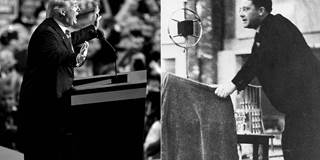Many liberals have been tempted to condemn Donald Trump’s behavior in personal terms, accusing him of incompetence and speculating about his mental stability. But there is a deeper – and even more troubling – explanation of the US president’s behavior.
HAMDEN, CONNECTICUT – In the wake of the NATO and Helsinki summits, many liberals have been tempted to condemn US President Donald Trump’s behavior in personal terms. His embrace of Vladimir Putin, and his snubbing of his own intelligence services and of America’s traditional allies, seem to reveal that he is out of his depth. Or that he was played. Or that he is mentally unstable. Or that he is Russia’s ultimate made man – a “traitor.”

HAMDEN, CONNECTICUT – In the wake of the NATO and Helsinki summits, many liberals have been tempted to condemn US President Donald Trump’s behavior in personal terms. His embrace of Vladimir Putin, and his snubbing of his own intelligence services and of America’s traditional allies, seem to reveal that he is out of his depth. Or that he was played. Or that he is mentally unstable. Or that he is Russia’s ultimate made man – a “traitor.”